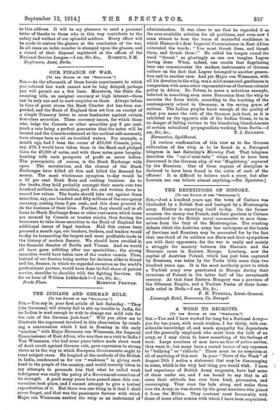THE INDIANS AND GERMAN RULE.
[To THE EDITOR Or THE"SPECTATOR.'] SIR,—You say in your first article of last Saturday : "They [the Germans] will utterly fail to stir up trouble in India, for no Indian is mad enough to wish to change our mild rule for the rule of the German jack-boot." Will you allow me to illustrate the argument involved in this observation by recall. ing a conversation which I had in Bombay in the early "nineties " with Major Hermann von Wissmann, the Imperial Commissioner of East Africa, who was then on a visit to India P Von Wissmann, who had some years before made short work of Arab revolt against German rule, gave expression to strong views as to the way in which European Governments ought to treat subject races. He laughed at the methods of the British in India, condemned us for our " weakness " in giving such heed to the people of the country. and would scarcely listen to my attempts to persuade him that what he called weak indulgence was really the policy of a Government conscious of its strength. A good many years have passed since this con- versation took place, and I cannot attempt to give a textual reproduction of it. But there was one thing in it that I shall never forget, and that was the passionate fervour with which Major von Wissmann exalted the whip as an instrument of
administration. It was clear to me that he regarded it as the ever-available solution for all problems, and even now I seem almost to hear the tones of masterful confidence in which Bismarck's first Imperial Commissioner in East Africa reiterated the words : " You must thrash them, and thrash them, and thrash them !" He rolled his tongue round the word " thrash " as gloatingly as one can imagine Legree having done. When, indeed, one recalls that flagellating hero one commiserates the modern instruments of German culture on the fact that Legree belonged to another genera- tion and to another race. And yet Major von Wissmann, with all his devotion to the whip, was a mild-mannered gentleman in comparison with some other representatives of German colonial policy in Africa. Dr. Peters, to name a notorious example, believed in something even more Draconian than the whip to exercise the force which, according to the teaching of the contemporary school in Germany, is the saving grace of nations. The Indian peoples know enough of the quality of what you name the rule of the German jack-boot, as it is exhibited on the opposite side of the Indian Ocean, to be in no danger of falling victims to the blundering blandishments of certain subsidized propagandists working from Berlin.—I [A curious confirmation of this view as to the German cultivation of the whip is to be found in a Petrograd telegram in last Saturday's Morning Post. That telegram describes the " cat-o'-nine-tails " whips said to have been discovered in the German ship of war 'Magdeburg,' captured by the Russians. One of these engines of discipline is declared to have been found in the cabin of each of the officers! It is difficult to believe such a story, but after Louvain one can believe almost anything.—En. Spectator.]


































 Previous page
Previous page